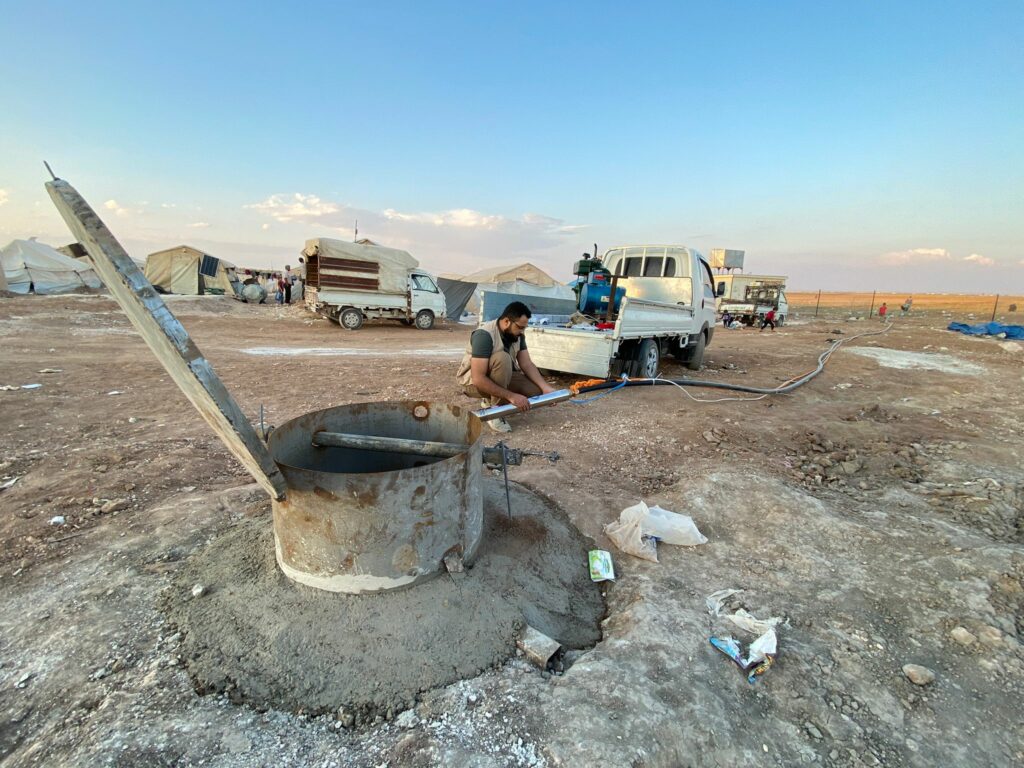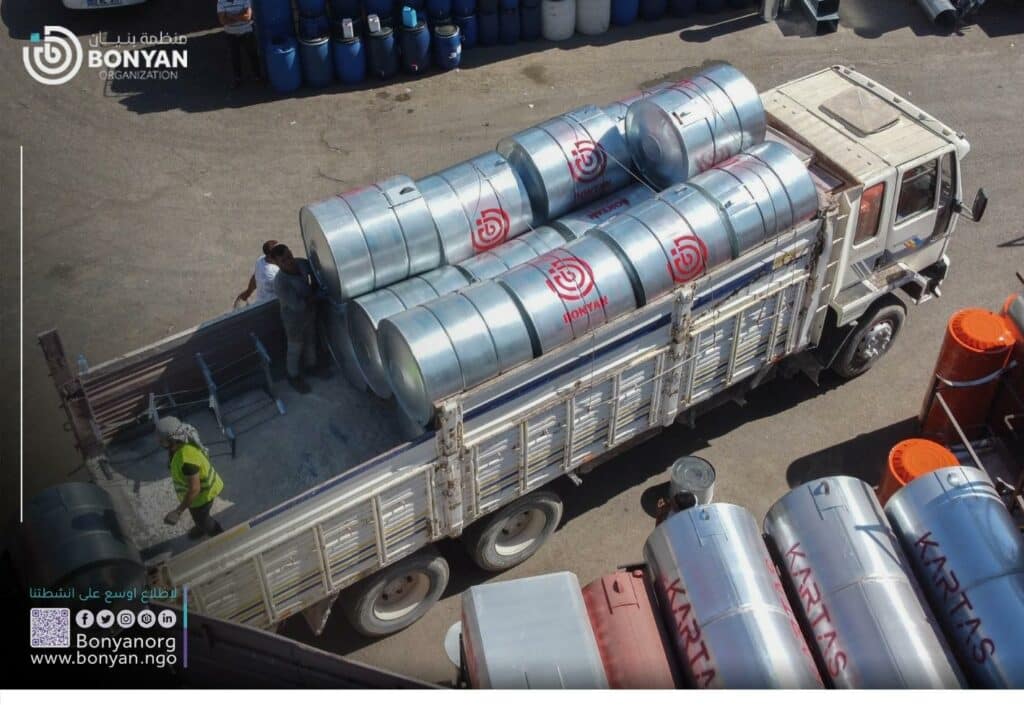Several refugee communities in war-stricken areas suffer from acute shortages in water supplies that affect their well-being and health.
In addition, these communities lack WASH (Water, Sanitation, and Hygiene) infrastructure.
It is estimated that many households within the refugee communities may share a communal toilet of up to 50 people.
Thus, these communities are in serious need of water and sanitation services that could contribute to improving their well-being and reducing many fatalities.
Challenges to Providing Adequate Water and Sanitation in Refugee Settings
Supplying refugees with water and sanitation has been a major problem since the advent of the refugee crisis.
Indeed, some key factors contribute to compounding the issue of water shortages in refugee settings.
Below are some challenges to adequately providing the refugees with water:
- The lack of financial resources due to rampant poverty and the soaring rates of unemployment.
- Lack of experience and knowledge when it comes to implementing water supply projects.
- Insufficient awareness of refugee communities’ lack of access to water and sanitation.
- Inadequate comprehensive research on water, sanitation, and hygiene issues in refugee camps.
Innovative Solutions for Providing Water and Sanitation to Refugees
Certainly, the lack of sanitation and hygiene facilities (WASH), as well as insufficient water supply in refugee settings, is one of the most pressing obstacles that refugees face today.
Therefore, governments, NGOs, and non-profits can address this issue by adopting the following steps:
- Improving sanitation facilities in the refugee camps by providing flush toilets.
- Raising awareness of hygiene habits through educating the refugees on proper hygiene practices, such as hand washing with soap and water. This habit could reduce diarrhea cases by up to 35%.
- Implementing a rainwater harvesting system to collect rainwater and store it for drinking.
- Building wells for extracting groundwater from underground aquifers.
- Establishing mobile toilets in isolated areas that have no access to basic facilities.
- Providing water-treatment tools to make the water safe for drinking, such as filters, solar disinfection, or flocculants.
- Promoting cost-effective solutions to improve water quality, such as plastic bottles that can be exposed to sunlight or chlorine tablets.

The Role of International Organizations in Addressing Water and Sanitation Needs in Refugee Populations
There is no doubt that civil society organizations, including international NGOs, non-profits, and charities, are working on addressing the issue of the lack of WASH facilities in refugee camps.
Millions of refugees today have no access to clean and reliable water sources and sanitation.
Several civil society organizations are working on WASH projects that can help provide those refugees with their basic rights to hygiene and sanitation.
Thus, limiting the spread of infectious diseases within the refugee settings.
One of the most significant campaigns organized by Bonyan Organization is “Clean Water for ONE Million Refugees – Syria, Yemen, and Gaza.”
This campaign aims at supplying 1 million people in Syria, Yemen, and Gaza with sufficient water supply. There are several key objectives for this campaign, which include:
- Providing the villages with equipment to store water.
- Repairing the damaged water facilities.
- Building wells to extract the groundwater.
You can support us with your benevolent donations to help rescue the lives of the needy by providing them with safe water and reducing their likelihood of contracting contagious infections.
Ensuring The Long-term Sustainability of Water and Sanitation Systems in Refugee Settings
One of the most important objectives that civil society organizations seek to maintain is ensuring the sustainability of water and sanitation systems across refugee areas.
Their effective interventions seek to realize this goal by:
- Protecting water sources against pollution.
- Disinfecting and treating surface water.
- Disenfictinga and repairing source catchments and equipment designed for fetching water.
- Referring to expert advice to assess water sources in refugee areas and develop new ones.
- Collecting the relevant data on water sources within the refugee locations.

Empowering Refugee Communities in The Management of Water and Sanitation Resources
Empowering the refugee communities and enabling them in the management of water and sanitation resources is a key factor for the protection of water resources within the refugee communities.
Thus, civil society organizations working on maintaining and operating water projects in those communities must hold training programs for the refugees.
These training programs should be concerned with teaching refugees some vocational, technical, administrative, and water maintenance-related skills.
Such skills are crucial for them to deal with any issue that might arise with water and sanitation resources.
The Link Between Water and Sanitation and Other Aspects of Refugee Well-being, Such as Health and Education.
Safe water and sanitation are undoubtedly extremely essential for refugees’ well-being and for improving their quality of life.
WASH services are integral to maintaining refugees’ health. Installing toilets will help preserve drinking and cooking water from being contaminated.
In addition, refugees are exposed to diseases and infections without safe water.
Similarly, women can be exposed to several diseases in the absence of sanitary and hygiene products.
This is because pathogens can spread inside refugee camps, leading to the spread of many contagious diseases.
At Bonyan, we work on many projects to supply the refugee areas with their WASH needs.
One of these projects is “Provide Clean Water to Syrian Camps.”
This project seeks to build wells to address the water needs of thousands of Syrian refugees in the camps located in northern Syria.
These refugees struggle to meet their daily needs of water for drinking, cooking, and sanitation.
Support us in our mission to supply hundreds of thousands of refugees with water, to save their lives, quench their thirst, and attend to their sanitary needs!
Help make a valuable contribution to those people’s lives!
Donate at the below links:
Resources
- Water, Sanitation and Hygiene.
- Program and Technical Support Section Geneva November 1992.
- NGOs and charities bringing drinking water to the world.
- 5 WAYS TO IMPROVE WATER QUALITY AND ACCESS.
- A review of water and sanitation provision in refugee camps.
FAQs
Why is sanitation so important in a refugee camp?
Sanitation is important in refugee camps because it prevents the spread of many diseases.
What are the 3 basic needs of refugees?
The 3 basic needs of refugees are:
-Health.
-Nutrition.
-WASH.
What is sanitation, and why is sanitation important?
Sanitation is concerned with hygienic services, facilities, and practices. It is important because it provides people with the hygienic environment needed to fight diseases.
What does WASH stand for?
WASH is a term that stands for Water, Sanitation, and Hygiene.
Content
- Challenges to Providing Adequate Water and Sanitation in Refugee Settings
- Innovative Solutions for Providing Water and Sanitation to Refugees
- The Role of International Organizations in Addressing Water and Sanitation Needs in Refugee Populations
- Ensuring The Long-term Sustainability of Water and Sanitation Systems in Refugee Settings
- Empowering Refugee Communities in The Management of Water and Sanitation Resources
- The Link Between Water and Sanitation and Other Aspects of Refugee Well-being, Such as Health and Education.
- Resources
- FAQs



